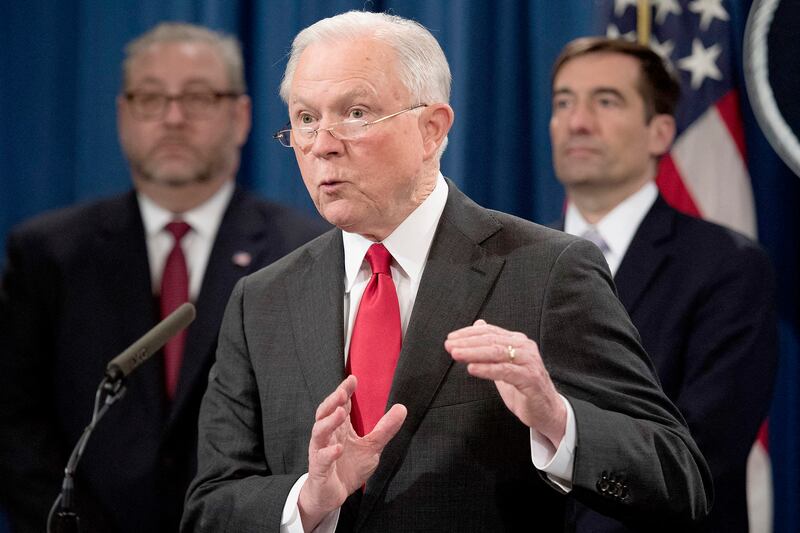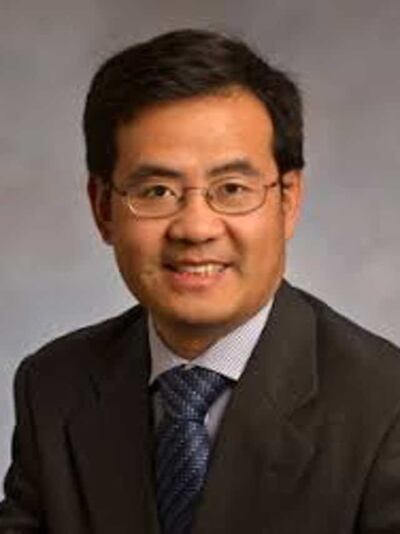On May 31, an American academic who studies the tiny nutrients that sustain marine life was pulled aside by immigration officials at Detroit International Airport. He was interrogated for an hour and had his laptop, Amazon Kindle, mobile phones and external hard drives confiscated.
“I had thought it was just one particular agent who, for whatever reason, thought that he was going to catch a spy or something and enhance his career,” the academic, Walker Orson Smith, told RFA. “But it now seems much larger than that.”
A sealed court order seen by RFA reveals just how much larger. Dated Aug. 11, the order grants a request by the U.S. Attorney’s Office for Eastern Michigan for a 90-day delay in notifying Smith that a search warrant had been granted in July for the FBI to “forensically image and review the data” on eight electronic devices seized from him at the Detroit airport.
According to the court order, Smith, along with several unnamed colleagues, is the subject of a federal investigation into alleged theft of trade secrets, false statements and wire fraud stemming from their involvement in China’s now-mothballed Thousand Talents Program, which sought to attract foreign scientists to work in Chinese universities.
“The Thousand Talent Program is widely associated with misconduct, property theft, and espionage. Moreover, it forms a core part of the Chinese Communist Party’s efforts to build its own power by leveraging foreign technology and expertise,” was the U.S. attorney’s characterization of the program in its application for the court order.
The investigation into Smith appears to be part of the China Initiative, a law enforcement program launched in 2018 by then-U.S. Attorney General Jeff Sessions to counter Chinese economic espionage. The program has come up against criticism in recent months from academics at top American universities and members of Congress over allegations of racial profiling, over-criminalization and baseless prosecutions.
Aged 71 and one of the leading experts on marine life off the coast of Antarctica, Smith holds the posts of emeritus professor at William and Mary College in the U.S. state of Virginia, and distinguished professor at Shanghai Jiao Tong University. The main focus of his work is the lifecycle of plankton in the Southern Ocean and its place in the food chain. His research has taken him around the world, with visiting professorships in Vietnam, Sweden and, most recently, China. Speaking with RFA, he described the allegations against him as “ludicrous” and said he believed the investigation to be a “fishing expedition.”
That the FBI should take an interest in him was bewildering to Smith. For starters, he said, his work does not have any commercial or military applications. He added that while some of his work does make use of a piece of restricted technology, he has always been careful to erect a firewall between those projects and his collaborations with Chinese scientists.
“I use it only in U.S. programs. In fact, I’m very paranoid about how to even discuss those data. But the instrument itself has been restricted for many years,” Smith said.
“And China is working very hard to catch up on that. But to be honest, I’m not an engineer, I couldn’t even help them with that anyways,” he added. “So, the theft of intellectual properties [allegation] is just kind of silly. I hate to say it, but it just doesn’t make sense.”

Electronic devices
The US Attorney’s Office for Eastern Michigan redirected RFA’s request for comment about Smith’s case and why he was being investigated to the U.S. Attorney’s Office for Eastern Virginia, whose director of public affairs, Karoline Foote, declined to comment.
The application for the secrecy order did not cite any specific allegations of trade secrets theft or wire fraud. Instead, in obtaining the secrecy order and the underlying search warrant, the U.S. attorney relied on three statements allegedly made by Smith while he was being interrogated at the airport in May.
“During a secondary inspection at the airport, Smith claimed that the electronic devices seized did not belong to the [Shanghai Jiao Tong University] SJTU (despite the fact that some had SJTU identifiers on them), that he could not remember the passwords to the devices, and that the Thousand Talent Program has been cancelled,” the U.S. attorney alleged in its application for the secrecy order.
“There is probable cause to believe that these statements are false. As a result, this Court authorized a search warrant of the electronic devices to further investigate these false statements.”
Smith told RFA he rejects the U.S. attorney’s characterization of all three statements. He insisted that none of the electronic devices seized belonged to Shanghai Jiao Tong University nor, he claimed, did they bear any of the Chinese university’s markings.
“It’s not true,” he said. “In fact, the computer very clearly had a tag from William and Mary [College]. The phones were obviously my personal phones. The Kindle was mine, and the thumb drives. There was no identifier on those things, so that statement is just false.”
Likewise, he says, the allegation that he falsely claimed not to remember the passwords for his devices is a distortion. During the interrogation, Smith says he was handed a piece of paper and asked to write down his passwords for everything from his email accounts to his online banking. To remember many of those, he says, he relies upon his computer, which had already been taken away from him.
“I wasn’t necessarily reacting negatively,” he said. “I don’t want to give people my bank account information. I think that is an inappropriate use of their power. So, I was hesitant to give them all that, but I did give it to them.”
And Smith is correct in stating that the Thousand Talents Program was cancelled. It was shut down in 2019, according to China Innovation Funding, an EU-funded database of Chinese financial support available to European researchers. The Thousand Talents Program’s website has been offline for over a year.
Yet there are enduring concerns in Washington about Chinese espionage, which have only intensified as Beijing has grown more defiant and assertive on the world stage, and U.S.-China relations have deteriorated.

Lawmakers raise alarm
Against that backdrop, U.S. lawmakers from both parties have raised the alarm over the potential exploitation by China of access to sensitive research at U.S. universities. This summer, the U.S. Senate passed legislation that would restrict scholars with ties to certain foreign talent programs from participating in U.S. government-sponsored research.
But the U.S. Justice Department’s prosecution of academics over their ties to China has also drawn criticism. On Sept. 8, 177 faculty members at Stanford University wrote to Attorney General Merrick Garland calling on him to shut down the China Initiative.
“We understand that concerns about Chinese government sanctioned activities including intellectual property theft and economic espionage are important to address,” they wrote. “We believe, however, that the China Initiative has deviated significantly from its claimed mission: it is harming the United States’ research and technology competitiveness and it is fueling biases that, in turn, raise concerns about racial profiling.”
The Stanford academics stressed the need for the government to acknowledge the “difference between the open fundamental research carried out at universities and the more applied and proprietary research” being carried out by the military and private sectors.
In July, 91 members of Congress also wrote to the attorney general to request “an investigation into the repeated, wrongful targeting of individuals of Asian descent for alleged espionage.”
The letter noted the case of University of Tennessee associate professor Anming Hu, who like Smith came under investigation by the FBI due to his involvement in the Thousand Talents Program. The FBI had initially suspected him of economic espionage for China, but eventually only charged him with the far lesser offences of wire fraud and giving false statements in relation to grant funding applications.
In acquitting Hu of all charges in September, Judge Thomas Varlan noted that the investigating agent in the case ultimately acknowledged that he was not “familiar with the ways in which universities engage with government agencies for purposes of sponsoring proposals.”
Hu has since been invited by University of Tennessee to return to work as a tenured faculty member. The university has also offered Hu backpay for the duration of his suspension, assistance re-establishing his research program and payment for an immigration attorney.
So far, the Justice Department has continued to stand behind the China Initiative in spite of the mounting criticisms. The Washington Post reported last month that officials have defended the program on the basis that, "There is no government comparable to China in scope and scale of policies designed to undercut the United States' technological edge, including through economic espionage and trade secret theft."
Beyond traditional spying
Cases against scientists and researchers "represent a small portion of the program," the Washington Post reported the officials as saying.
“The initiative extends into academia because China’s efforts go beyond traditional spying to recruit researchers whose work – even if unclassified and eventually published – can benefit the Communist-led government,” the paper quoted officials as saying.
In Smith’s case, the U.S. attorney’s application for the secret search warrant stated that Shanghai Jiao Tong University where he worked “has links to China’s People’s Liberation Army.”
The university is categorized as "high risk" on a database compiled by the Australian Strategic Policy Institute and funded by the U.S. State Department that catalogues the collaboration of educational institutes with the PLA and Chinese security agencies.
But Smith said that beyond the first-year military training that is mandatory for all Chinese undergraduates across the country, he is not aware of any links between the university and the PLA.
He contends that the U.S. government is failing to properly distinguish between the worlds of academia and national security.
“It seems like they don’t understand how either science or academics works. You know, the free flow of information, in terms of publication, is critical. I believe that and will continue to believe that,” Smith said.
“I can understand restricting commercial things and sensitive military information, I’m all for that,” he added. “But restricting information that’s for the benefit of mankind is counterproductive.”
“I’ve been trained to provide knowledge, to provide mentoring, to improve the state of our understanding about the ocean. I think that’s a good thing. So, to turn that into an accusation seems very blind.”
While he acknowledged that there is a risk in speaking out publicly that he will provoke an outsize reaction from the Justice Department, he said he hoped that by doing so others might be spared a similar predicament.
“It’s not how I like to think my country should operate,” he said. “I’m dismayed that my own government is harassing – and I consider it illegally harassing – individuals for no cause.”
“You know, Martin Luther King was right, the truth shall set you free,” he added. “I could predict that if a random group of Americans were to read your story, half of them would say ‘Well, he’s obviously a spy, throw him in jail.’ And the other half would say, ‘Government’s out of control again.’ That’s the way it is.”
